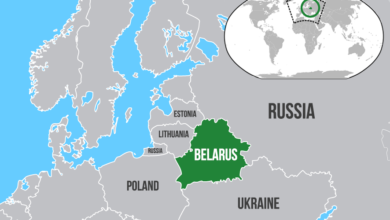The scene is familiar. The script being played out is one used by the
United States and its imperialist allies against independent countries
holding elections where pro-imperialist candidates have no chance of
winning. Elections are called fraudulent, demonstrations are held by
predominantly privileged sectors of society and the police stand accused
of violence when often it is right-wing demonstrators who instigate the
violence. In the final act, the corporate media delegitimizes the
elections.
This time, the script is being played out in Belarus, an Eastern
European country of 10 million people that was formerly a republic of
the Soviet Union. Belarus held presidential elections on Dec. 19. The
final election results were announced by the Belarus Central Elections
Commission on Dec. 24.
As expected, incumbent Alexander
Lukashenko was re-elected president. Nearly 91 percent of those eligible
voted. Lukashenko received over 5 million votes, nearly 80 percent of
the votes cast. The official count conformed to pre-election polls
conducted by various polling agencies. Baseless imperialist accusations
of “tyrant” and “dictator” notwithstanding, Lukashenko is an immensely
popular leader. In the previous elections in 2006, Lukashenko received
83 percent of the vote. The results of the elections were no surprise to
anyone.
But that did not stop the “pro-democracy” forces from
crying foul, even before election day. Opposition candidates called for a
rally in central Minsk, the capital of Belarus, at the Oktyabrskaya
Square, which had been turned into an ice rink for the winter holidays.
The attempted counter-revolution was dubbed “revolution on ice skates.”
The
demonstrations resulted in some violence, at least in part instigated
by the demonstrators. Protesters were confronted by pro-Lukashenko youth
and the police. About 600 people were arrested, but no deaths or
serious injuries were reported.
Russia’s ambassador to Belarus,
Alexander Surikov, said that Lukashenko’s victory had been “expected”
but that opposition candidates “understood that they cannot win, and
attempted to carry out a ‘yellow’, ‘orange’ or whatever else
[revolution].”
Without the benefit of any evidence, or even
plausible accusations, the United States and Western European
imperialists denounced the elections. The top European Union diplomat,
Catherine Ashton, and U.S. Secretary of State Hillary Clinton said in a
statement: “Taken together, the elections and their aftermath represent
an unfortunate step backwards in the development of democratic
governance and respect for human rights in Belarus. The people of
Belarus deserve better. … Without substantial progress in these areas,
relations will not improve.”
But imperialist hostility toward
Belarus has nothing to do with how elections are conducted or how
democratic it is. A glance at the CIA World Factbook reveals the real
reason why Belarus is not considered a member of the “community of
democracies”:
“Belarus has seen limited structural reform since
1995, when President Lukashenko launched the country on the path of
‘market socialism.’ In keeping with this policy, Lukashenko reimposed
administrative controls over prices and currency exchange rates and
expanded the state’s right to intervene in the management of private
enterprises. Since 2005, the government has re-nationalized a number of
private companies.
“In addition, businesses have been subjected
to pressure by central and local governments, including arbitrary
changes in regulations, numerous rigorous inspections, retroactive
application of new business regulations, and arrests of ‘disruptive’
businessmen and factory owners. Continued state control over economic
operations hampers market entry for businesses, both domestic and
foreign.”
So Belarus is labeled an evil country because the state
imposes serious limitations on international and domestic business,
unlike the United State and other imperialist countries, where business
runs the state.
And what has been the result of this economic
“mismanagement?” The bourgeois media often refer to Belarus as an
“impoverished” country where the economy is in “tatters.” Well,
according to the CIA World Factbook, the GDP of Belarus grew 8.6 percent
in 2007 and 10.2 percent in 2008. Even in 2009, when the world
capitalist economic crisis caught up with Belarus, the GDP still grew,
albeit at only 0.2 percent. This is for a country with negative
population growth.
The CIA Factbook lists the unemployment rate
for Belarus at 1 percent, a number never achieved by imperialist
countries even in the boom phase of their business cycle. Belarus has a
literacy rate of 99.6 percent. Various other economic and social
indicators are evidence that, far from being a nightmarish place,
Belarus is a fairly nice place to live for working people and, for the
same reason, a terribly restrictive place for capital.
This is
the second time that the West has attempted to wreak havoc through
elections in Belarus, the first time being the 2006 elections. The
imperialist objective was to emulate the model of “revolutions” that had
been implemented in other former Soviet Republics.
The United States supported staged street demonstrations to
destabilize the governments of the Ukraine, Georgia and Kyrgyzstan.
These “revolutions,” deemed the “Orange Revolution,” the “Rose
Revolution,” and the “Tulip Revolution,” respectively, resulted in
U.S.-favored candidates coming to power. In June 2009, a “Green
revolution” in Iran failed to bring about regime change.
The crime: resisting privatization
There
is, of course, a history behind the U.S. government’s hostility towards
Belarus. One of the founding republics of the Union of the Soviet
Socialist Republics, Belarus was one of the first regions to be invaded
by Nazi Germany. Remaining under occupation until 1944, the German
imperialists killed approximately 3 million Byelorussians and destroyed
much of the infrastructure. Only in 1971, 26 years after the end of the
war, did the population of Belarus reach its pre-war levels.
Under
the direction of the Soviet planned economy, Belarus became one of the
industrial centers of the Soviet Union, gaining relative prosperity.
With the breakup of the Soviet Union in 1991, capitalist reforms swept
across the former Soviet Republics. State-owned industries and lands
were privatized and sold to foreign and domestic capital at dirt-cheap
prices. The privatizations and shutdowns of factories judged to have
insufficient profit potential brought about massive unemployment and a
huge drop in the standards of living.
The same process ravaged
Belarus. “During 1991-1995, with the support of international finance
organizations, Belarus initiated preliminary reforms toward transforming
into a market economy,” according to the World Bank’s 2003 Belarus
Country Brief. The country’s GDP declined by an estimated 40 percent
during this period.
“From late 1995 onwards, however,” the World
Bank report continues, “the Government sought to insulate its
population from the pain of reform by protecting jobs and wages. The
state retained control over most production resources, and a significant
share of GDP was allocated to social expenditures and subsidies.
Market-oriented reforms were very limited.”
Under the leadership
of Lukashenko since 1994, Belarus put a halt to the privatizations and
proceeded to use the country’s resources to maintain the government’s
social programs and social infrastructure. The World Bank describes the
outcome: “The country retains many features of a planned economy, with
the Government wielding significant control over the factors of
production and the decisions of economic agents, a high tax burden and
major budget redistribution of funds aimed at supporting traditional
companies and employment. The agricultural sector remains largely
unreformed, small and medium enterprises have undergone a minimal level
of development, and a considerable share of GDP is allocated to social
expenditures.”
In 1995, the IMF and the World Bank stopped
loaning money to Belarus, citing the country’s refusal to implement free
market reforms.
The strategy to financially isolate Belarus
backfired. Not only did Belarus avert financial and social crisis, its
economy flourished. From 1996 to 2004, the economy went through a steady
period of expansion averaging an annual growth of 6.6 percent. (World
Bank, “Belarus: Window of Opportunity to Enhance Competitiveness and
Sustain Economic Growth,” November 2005) This growth persisted while the
rest of the former Soviet republics experienced economic decline.
To the imperialists, these are the crimes of the Lukashenko regime.
It has refused to privatize, erected barriers against imperialist
capital penetration and maintained a high standard of living for its
citizens, along with a relatively equitable distribution of wealth. All
of these factors present substantial barriers to international investors
who view mass poverty and high unemployment as favorable conditions for
their investments.
Demonizing Lukashenko
The
imperialist campaign against Belarus’ national development would not
have been complete without the customary demonization of its leader,
Alexander Lukashenko. Lukashenko has for years been described as a
“dictator,” an “autocrat” and “tyrannical” by Western media. He has
been likened to many previously demonized leaders, most of all to
Yugoslavia’s Slobodan Milosevic.
Lukashenko was a member of the
Young Communist League in his youth, a deputy chairman of a collective
farm in the early 1980s, and then the director of a state farm and
construction materials plant in the Shklov district. In 1990, Lukashenko
was elected to the Supreme Council of the Republic of Belarus. In
December 1991, Lukashenko was the only deputy of the Belarusian
parliament to vote against the breakup of the Soviet Union.
In
1994, as Belarus plunged into the “free” market capitalist economy and
its state industries were sold off, Lukashenko ran on a campaign of
fighting corruption, saving jobs and protecting the interests of the
common people. He won the election with 80 percent of the vote.
Imperialism and ‘democracy’
Belarus
is a clear illustration of the real approach of the imperialist
bourgeoisie toward elections and democracy. With the dominance of
bourgeois institutions over society, the capitalist class relies on
elections to promote its class agenda and to keep class antagonisms in
check. While the electoral process may force the bourgeoisie to make
concessions to the working class, it structurally precludes the working
class from gaining power and challenging the existing productive
relations. This is why bourgeois mouthpieces use the terms democracy and
capitalism interchangeably.
But the commitment of the
bourgeoisie to its own form of democracy ends the minute elections
generate an outcome that is unfavorable to its class interests. That is
why popularly elected presidents, such as Belarus’ Lukashenko and
Venezuela’s Hugo Chavez are still called dictators.
In 1993, when
the Russian parliament voted to impeach U.S. puppet Boris Yeltsin,
Yeltsin dissolved the parliament and used the military to nearly
demolish Russia’s White House, where the parliamentary representatives
had deliberated. The imperialist media did not condemn Yeltsin for his
authoritarian and anti-democratic actions. To the contrary, they praised
him for his courageous commitment to reform against the hardliners, the
hardliners being representatives of the Russian parliament elected in
the early post-Soviet era.
From a Marxist perspective, all states
are instruments of class domination, representing a class dictatorship,
whether they are democratic or autocratic in form. Bourgeois
politicians understand this concept too well. In fact, they operate on
the basis of this principle.
The developments in Belarus
demonstrate the utter falsehood of the pretense of capitalist states’
commitment to democracy. Contrary to common propaganda, not only are
capitalism and democracy not synonymous, they are incompatible. By
re-electing Lukashenko, the people of Belarus, have taken one further
step in the direction of real democracy and away from the tyranny of
capital.




